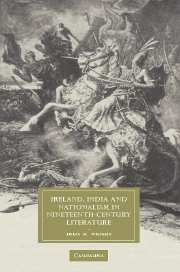Book contents
- Frontmatter
- Contents
- Acknowledgments
- Introduction: Insensible Empire
- PART I National Feeling, Colonial Mimicry, and Sympathetic Resolutions
- PART II Colonial Gothic and the Circulation of Wealth
- 4 On the frontier: sensibility and colonial wealth in Edgeworth and Lewis
- 5 “Some Neglected Children”: thwarted genealogies in colonial history
- 6 Bram Stoker and Oscar Wilde: all points east
- Conclusion: The Wild Irish Boy in India
- Notes
- Bibliography
- Index
- CAMBRIDGE STUDIES IN NINETEENTH-CENTURY LITERATURE AND CULTURE
4 - On the frontier: sensibility and colonial wealth in Edgeworth and Lewis
Published online by Cambridge University Press: 31 July 2009
- Frontmatter
- Contents
- Acknowledgments
- Introduction: Insensible Empire
- PART I National Feeling, Colonial Mimicry, and Sympathetic Resolutions
- PART II Colonial Gothic and the Circulation of Wealth
- 4 On the frontier: sensibility and colonial wealth in Edgeworth and Lewis
- 5 “Some Neglected Children”: thwarted genealogies in colonial history
- 6 Bram Stoker and Oscar Wilde: all points east
- Conclusion: The Wild Irish Boy in India
- Notes
- Bibliography
- Index
- CAMBRIDGE STUDIES IN NINETEENTH-CENTURY LITERATURE AND CULTURE
Summary
LXVI
And all this wealth by Hastings stor'd,
Been swift to Britain's coffers pour'd;
Nor left one Jagier to sustain,
My lonely life's afflicted wane.
LXVII
And still full oft with fell controul,
Distracting terrors rack my soul,
Lest, transient as a meteor's blaze,
Shou'd shine the splendor of my days.
Elizabeth Ryves, Canto I of The Hastiniad (1785)While political relations could be framed in literature on sentimental terms, whether as “benevolence” that stabilizes colonial hierarchical relationships or through national or religious feeling that unites the people against the colonial oppressor (see Chapters 2 and 3), the driving force in colonial practice was arguably economic. Absentee landlords might have been lacking a properly benevolent interest in the welfare of their tenants, but they also retained their Irish property because it was worth money to them. Ireland offered cheap labour, natural resources, a tax base, and, as long as it was peaceful, allowed for greater military security along Britain's western coast, including important ports such as Bristol. Indeed, United-man poet Drennan went so far as to argue, and at some length, that the key motive for the Act of Union (1800) was “to make an arsenal here, a post there, and an advanced redoubt of ” Ireland as part of British military strategy against post-Revolutionary France. However, open discussions of the profitability of the British colonial project in Ireland in the early nineteenth century are relatively few and far between.
- Type
- Chapter
- Information
- Ireland, India and Nationalism in Nineteenth-Century Literature , pp. 119 - 141Publisher: Cambridge University PressPrint publication year: 2007



